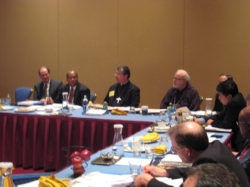From Cardinal Seán’s blog
I have just returned from the fall assembly of the United States Conference of Catholic Bishops in Baltimore and the most important topic discussed there was the Church’s pro-life stance, particularly in light of the recent election.
There were several discussions in our regional meetings and when we gathered as bishops in our executive sessions.
Many ideas were proposed. Out of those, Cardinal Francis George, the Archbishop of Chicago and the president of the conference, distilled a very good statement that reflects a strong and unified sentiment of the Catholic bishops of the United States.
Therefore, I have asked that the statement be read or distributed at all the parishes at Sunday Masses.
Of course, we are eager to work with the incoming president and cooperate with the government on the good works that the Church has been involved in historically, such as serving the poor, in social services, education and working for peace and reconciliation.
But, we want to make it very clear that as Catholics we are committed to work to establish just laws that will protect human life, which is the most basic of all rights.
We realize there are many threats on the horizon, particularly the so-called “Freedom of Choice Act.” The intent of FOCA is to make abortion much more common and to have these abortions funded by the people’s tax dollars. It would also remove any possibility of parental oversight. FOCA would be a radical and disastrous legislation that we need to make people aware of.
We also want to point out that the outcome of the presidential election was in great part a result of the economic crisis and our global involvement in the war on terrorism, particularly in Iraq. It was not a mandate for a liberalization of laws concerning abortion or marriage. In fact, some of the states that voted for President-elect Obama also passed referendums defending traditional marriage.
The pro-life cause will always be at the center of the Catholic social teaching.
There is not some “new way” of being pro-life by saying, “I am going to work for economic justice” and that, somehow, is going to substitute for trying to put guarantees in the laws that will protect human life from the first moment of conception.
Traditionally, the Church has worked for a more just social order and to provide services and help to women in difficult straits. But, we must not lose sight of the serious obligation that we have to work for just legislation.
Cardinal George expresses those themes very eloquently in his statement drafted on behalf of the bishops conference.
The assembly with the bishops in Baltimore was very productive. Our plenary session began Monday morning, but we have always added committee meetings before and after our general session. This saves time and money on travel because we are already together.
I arrived Friday night because Saturday morning I had the administrative board meeting, and then in the afternoon, I chaired the committee meeting on Clergy, Consecrated Life and Vocations. Also on Saturday and Sunday, I participated with the committees on Latin America, Africa, Immigration and pro-life activities. Sunday, I also attended the board meeting for the National Shrine.
One of the highlights of the trip was the dinner hosted by the Military Archdiocese on Nov. 11, Veterans Day. Three of our priests who are working with the military attended with me, Coast Guard Chief of Chaplains Father Bill Cuddy, Father Paul Hurley and Father John McLaughlin. Father McLaughlin is on loan to the Military Archdiocese to support and increase vocations to the military chaplain corps.
One of the presentations given before the meeting began was on the importance of new technology. They talked about blogs and other ways to use the Internet to spread the Word. Of course, with all the committee meetings I could not attend, but I really felt re-affirmed in my own blog.



















